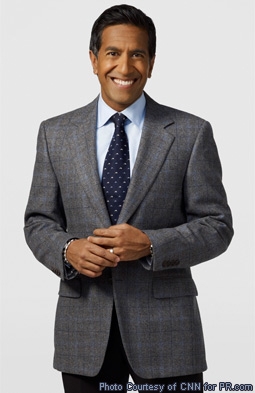
CNN’s Chief Medical Correspondent, Dr. Sanjay Gupta. We hear his name announced on CNN and our bleary politically-fatigued minds and bodies instantly spring to life with the anticipation of groundbreaking medical reports, courtesy of one of the world’s most renowned neurosurgeons.
Dubbed “The World’s Doctor” by former President Bill Clinton, Sanjay Gupta’s broadcasting career with CNN began more than a decade ago, but really gained traction with viewers in 2003 when Gupta embedded himself in Iraq to report on the status of our soldiers’ condition. What began as a reporting expedition for Gupta rapidly switched gears when he was asked to perform a series of impromptu surgeries that subsequently saved American lives. That same year, People magazine honored then thirty-three year old Gupta with a nod in their annual “Sexiest Men” issue.
Sanjay Gupta has long since graduated from the occasional medical correspondence to become a pivotal ingredient for the success of CNN’s twenty-four hour news model with his own thirty minute medical show, Sanjay Gupta MD, airing Saturday and Sunday mornings on CNN. We’ve watched Dr. Gupta as he cradled a newborn baby in earthquake ravaged Haiti in 2010, deconstructed the effects of addiction on the human brain, and went head-to-head in heated debate about healthcare policy with documentary filmmaker, Michael Moore.
Now Sanjay Gupta has embarked on a new phase of his medical career, as a novelist. Gupta is releasing his first work of fiction, a book titled, Monday Mornings. In Monday Mornings, Dr. Gupta’s novel takes readers inside the lives and emotional ups and downs of a group of top neurosurgeons at Chelsea General Hospital. The book also sheds light on clandestine Morbidity and Mortality meetings that take place each Monday morning where doctors dissect and scrutinize the medical errors of their peers. Gupta’s storytelling abilities in Monday Mornings is so raw and compelling that veteran television producer, David E. Kelley, came calling to bring Monday Mornings’ fictional hospital, Chelsea General, to the small screen.
In this interview with Dr. Sanjay Gupta I question him about some of his own triumphs and challenges as a physician and neurosurgeon. He spoke with great candor and a bit of healthy humor about everything from what it’s like inside the operating room, to making life and death diagnoses, and overcoming personal emotions to save lives.
PR.com (Allison Kugel): Your novel, Monday Mornings, is a work of fiction but it reads as though it is very personal. Is the book a thinly veiled memoir of your experiences as a neurosurgeon, or are the characters complete works of fiction?
Dr. Sanjay Gupta: Everything is reflective of our lives to some extent. The characters are composites of people that I’ve met, certainly some of my own experiences. There is a part of that, for sure, where it does have some personal stories and experiences in it.
PR.com: Monday Mornings deals with what I would consider to be a taboo topic which is when doctors make mistakes and the procedure by which hospitals deal with those mistakes and learn from them. By giving a glimpse into these Monday morning meetings are you revealing what has, up until now, been a well-guarded secret for hospitals?
Dr. Sanjay Gupta: It’s not so much that it’s a secret. Although I was surprised at how few people did know that a meeting like this even existed. I think what I’m revealing is, I’m actually taking people inside of it. No one is invited to these meetings except for the people that are directly involved. You get a chance to see something that very few people ever get to see. The fact that the meeting exists is a revelation for a lot of people, but exactly what happens inside the meetings is another step of it. Then the third part of it is why the meeting exists and what comes out of the meeting. [It’s] the whole philosophy of openly discussing mistakes. You want to learn something from it.
PR.com: It stands to reason, after all, doctors are human. Just like in any other field or at any other craft, you need to learn from mistakes. That’s how you get better and that’s how other doctors learn. But in the case of the characters in your book, and for all surgeons, these mistakes take place in practice, in the operating room.
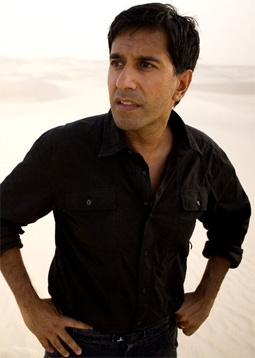
Dr. Sanjay Gupta: You’re right. It’s unsettling to think about it and when people half joke that they still call medicine the “practice of medicine,” there is some real meaning behind that. As much as you can learn from textbooks and from didactic lectures, the fact of the matter is that the big advances in medicine and science do come about with this sort of trial and error. Like you said, it’s tough to acknowledge, but it is absolutely true.
PR.com: These Morbidity & Mortality conferences as they are called, are going on in every hospital in the country?
Dr. Sanjay Gupta: I looked up some data on this. Certainly ninety percent of academic programs have it; that’s programs where they are actually doing teaching and instructing residents. And I think in most private hospitals as well. So sixty or seventy percent have them in private hospitals. It’s not in every single one, but it has become a pretty common thing over the last hundred years.
PR.com: Are you still practicing medicine as a neurosurgeon, or are you mostly a medical journalist at this point?
Dr. Sanjay Gupta: I do practice, and it’s about fifty percent medicine and fifty percent media. That’s where it’s evolved over the past ten years. But I love being a doctor. I still operate every week, every Monday for sure, and every other Friday. I see patients in the office on Thursday, so I’m still pretty busy, clinically. In some ways I’m probably as busy clinically as I was before. What I don’t do as much of is the basic science research, certainly, and my clinical papers have had to drop off a bit because I spend more of my time writing for the television stuff. But in terms of the actual practice of medicine, I’m about as busy as I’ve ever been.
PR.com: Back in 2003 you headed to Iraq as a medical journalist to assess the condition of our soldiers fighting in the Iraq war. You ended up operating on some of those soldiers. Tell me about that.
Dr. Sanjay Gupta: I went there as a reporter. I was embedded with a group of doctors called the “Devil Docs,” an order of Navy doctors who supported the 1st Marine Expeditionary Force. It was something that I wanted to do. I had always been interested, from a medical standpoint, what happens in war when we take care of people on the battlefield? A lot of people are getting hurt, and what happens to them? The doing surgery over there, it was one of these situations where I was the only neurosurgeon in a particular area of the battlefield where I was embedded. I’d been there for two months embedded with these Marines and they were seeing patients with gunshot wounds to the head. They said, “Hey, can you take off your journalist’s cap and put on your surgeon’s cap and help out?” Of course that was the right thing to do so I did, several times.
PR.com: Your book, Monday Mornings, centers on the lives of a group of neurosurgeons. The story demonstrates that even the most well-educated and most revered doctors can be deeply flawed individuals, and how sometimes those personal issues can actually interfere with their professional performance. How do you, yourself, overcome personal issues in the operating room or when making a diagnosis?
Dr. Sanjay Gupta: I think the vast majority of the time, doctors, either because of their training or because of the kind of people that end up going into medicine, are able to separate the two. The point that I was trying to make with a couple of those stories in the book is that a mistake happens and people tend to think of those in binary terms. A mistake happened, so therefore that person is a bad doctor, maybe even a bad human being. And that could be true. There are bad doctors, just like there are bad anything. But [the character of] Jorge Villanueva, for example, was an amazing doctor and he was the purest of all my characters. The thing about Jorge is that he always did the right thing. So when he makes a mistake regarding this white supremacist [patient] in the ER it’s not forgivable, but there is a story behind Jorge’s mistake. It doesn’t excuse it at all, but you understand that he was a victim of severe racism when he was growing up. I don’t know that there is a magic answer to leaving behind your own personal history and just taking care of the patient. I think most doctors do a great job of that, but there are always stories that most people never get to see. You get to see it in this book, through the vehicle of the Morbidity and Mortality conference, and through getting to know these characters.
PR.com: Have you ever found yourself confronted with a personal dilemma, either in your office, or in the OR?
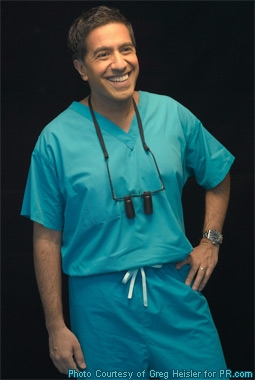
Dr. Sanjay Gupta: It was a situation where a child was involved. In the book I gave a glimpse into this story. Someone who was a pretty revered member of our community was drunk and threw his kid in the car without adequate restraint, and he crashed that car. In the book I changed it a bit, but in the real life situation the kid died and the drunk driver was badly injured. We cared for him but it was really hard for me to forgive the guy. He basically killed his kid because of his reckless disregard, and we still had to care for him. I think it was a challenging thing for all of us involved, especially as parents.
PR.com: You were angry, which is natural.
Dr. Sanjay Gupta: Right, and in the end you start to think this is a bad person; this is a bad human being and right now I’m being asked to save his life, which we did. But it’s that sort of sentiment which is inescapable. I don’t know how you completely separate yourself in a situation like that when you see a kid brought in dead and an alive parent who was too drunk to be driving a vehicle, and essentially killed the kid as a result. I don’t know if you read that particular part of the book…
PR.com: I did, and in the book the man had been smoking marijuana…
Dr. Sanjay Gupta: That’s right, and the kid survives.
PR.com: Because that’s how you wish it had actually turned out.
Dr. Sanjay Gupta: Maybe.
PR.com: As a neurosurgeon and a scientist you’ve studied every facet of the human brain from motor skills and memory to addiction and disease. That being said, do you believe that we have a soul, or do you believe that we are merely organic computers?
Dr. Sanjay Gupta: I don’t think I’ve ever been asked that before. That’s a good question. I guess I’ve always believed people have a soul, and that’s not something that I could subjectively prove. What’s the old saying that scientists use? “In God we trust. Everyone else bring data.” (Laughs). There’s no data on this one. But to me it’s inconceivable that there isn’t more than a bunch of carbon that comprises us as human beings. Exactly what to call the other thing, whether it’s a soul or something else, what it’s made of or where it goes, I don’t know. But my simple answer to the question is I think we have a soul in the way that you’re describing it.
PR.com: Aside from scientific evidence, throughout your travels as a physician have you come across anecdotal evidence that you’ve filed away in the back of your mind?
Dr. Sanjay Gupta: Do you know what the word, teleological, means? It basically means when an outcome has occurred you try and work it backwards to explain it. For example, in the religion of Hinduism there is this belief that there is a Nirvana. Nirvana means an absolution of all worldly things, and that you’re ready to move on to whatever is the next thing. It was kind of crunchy granola stuff for me when it was explained to me as a scientist. When you see deaths that are completely inexplicable, like in a young kid or just some horrible, horrible death, you think to yourself, “Why would that happen? How could any justification in our universe possibly let that happen?” And then you think to yourself that if there is such a thing as Nirvana, this idea that someone has achieved a sense of inner peace and they are actually ready to be absolved of earthly attachments, then perhaps that could explain it.
PR.com: Aside from your work as a neurosurgeon and your work in medical journalism with CNN, you currently hold a post at Emory University School of Medicine as a professor.
Dr. Sanjay Gupta: I’m an assistant professor, I don’t want to give myself extra promotions here (laughs). I’m a staff neurosurgeon, an attending neurosurgeon there.
PR.com: Ok, I won’t promote you (laughs). But you are teaching medical students, yes?
Dr. Sanjay Gupta: Correct, and the way it works in the surgical field is that whenever I operate I have residents and medical students in the operating room with me. When I see patients in the office or when I am making rounds, they’re with me there as well. We do some didactic lecturing, but most of what we do is to teach them how to operate and teach judgment in terms of examining patients and figuring out the care that they need. It’s not classroom stuff as much as it is true practical stuff.
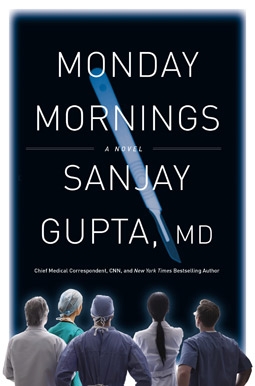
PR.com: Unlike in most professions, a mistake in medicine, particularly in neurosurgery, could mean the difference between life and death for a patient. Are these medical students taught how to exist within that space and not get crushed by the pressure, and to accept the fact that they will from time to time make mistakes?
Dr. Sanjay Gupta: This is one of those things where… the way I learned it was when I was in the situation where something had happened to a patient or a situation like the one that I described with the car accident, and I felt like disengaging. I felt like saying, “Look, I’m not sure I’m cut out for this. Do I really want to be in a situation where I’m operating on this guy who ultimately killed his kid?” It took somebody who was more experienced and had been through it before to say, “Look, take a day to get your head around it and realize that what you do is important. Everything is not going to turn out great, but don’t measure yourself by the bad stories, measure yourself by the good ones.” It’s not something I teach as a pre-scheduled lecture or discussion, but if something like that were to happen I have been blessed with good mentors and teachers, myself, and I would convey some of those same lessons.
PR.com: Something I found interesting from reading your book that I never knew is that surgeons have playlists of music that they like to listen to at the beginning, the middle and at the end of performing an operation.
Dr. Sanjay Gupta: Exactly (laughs). I do, and I think different surgeons have various strategies on how they handle it, but I like music and I’m always trying to mix it up. There was a time when I was always the youngest guy in the room. What’s funny now is as I’ve gotten older, I’m forty-two, I’m turning into one of the older guys. But music is the one great common denominator. I can keep up with all the latest music when I’m operating, and I’m surrounded by young guys in their mid-to-late twenties and early thirties who are always swapping playlists. It’s kind of fun.
PR.com: Can you take me through the typical playlist you listen to when you’re performing brain surgery?
Dr. Sanjay Gupta: Here we go. This is literally from the last operation I did on Monday: Finger Eleven by Paralyzer; Weezer; Just Breathe by Eddie Vedder; You Are A Tourist by Death Cab for Cutie; Fidelity by Regina Spektor; The Only Living Boy In New York by Paul Simon; Hold On Hope by Guided By Voices; Painkiller by Turin Brakes; Fix You by Coldplay; and I got Moving Along by All American Rejects. And then I actually got back to Paralyzer which means the operation took almost two hours (laughs). I can tell how long my operation takes if I hear the same song again.
PR.com: How did David E. Kelley link up with you and decide to adapt your book Monday Mornings into a television series?
Dr. Sanjay Gupta: I was talking to a guy about some health applications for these various tools that we were thinking of for the iPad and the iPhone, and this guy happened to be an agent. He asked me what other things I was working on and I told him I had just finished this book, and I described it to him. He happened to be David E. Kelley’s agent as well. A week and a half later David got ahold of me and told me he loved the book. He’s done a bunch of legal shows like The Practice and Boston Legal, but he also did Chicago Hope. He started outlining some of his ideas to me and I trusted him. When you write these characters and create them they’re like your kids. Nobody else knows them as well as I do. When David said he wanted to do [a show] and he wanted to turn these characters into three dimensional people, it was a little hard for me to put my arms around in the beginning, but I think he’s brilliant and the pilot we’ve come up with is very true to the book.
PR.com: I know the television pilot has been titled Chelsea General which is the name of the fictional hospital in your book. But do you think the show’s title should be Chelsea General or Monday Mornings, like the book?
Dr. Sanjay Gupta: It’s so funny with these types of things, Allison. I liked the title Monday Mornings. The reason I picked Monday Mornings (referring to the title of his novel) was because when you think about Monday morning quarterbacking you think about people reflecting and trying to do a little retrospective, in this case with some particular events, but it could be with their own lives. You also have an aspirational quality because Monday morning is a beginning, not an end. And it played on the words with M & M being both for Morbidity and Mortality and Monday Mornings. But here is the funny reality of this sort of thing. It’s confusing to have a show called Monday Mornings on a Thursday night.
PR.com: Ah!
Dr. Sanjay Gupta: So I came back to them and said, “Well, what about the show Friday Night Lights and they said, “That was a real problem.” It was on Friday night, but then when they moved it to Sunday it was very confusing for everybody.
PR.com: That’s why I’m not a television executive (laughs)!
Dr. Sanjay Gupta: (Laughs). Me either. That was not intuitive to me. And I do like the name Chelsea General. Chelsea was a town I grew up in, so I have a fondness for the name Chelsea. Some of these decisions you have to relinquish control of, otherwise it will drive you insane.
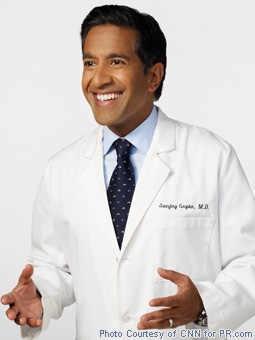
PR.com: In your opinion, what was the best TV medical drama of the past thirty years?
Dr. Sanjay Gupta: For me it was St. Elsewhere. Keep in mind that you watch shows at different stages of your life. When I watched St. Elsewhere I was not yet a doctor. I wasn’t even old enough to really be considering medicine at that point. I think it was very profound for me because it influenced some of my career choices. I have a great fondness for that [show]. Chicago Hope was a close second.
PR.com: We have a heated political race going on right now where healthcare is a heavily debated topic. What’s your position on what’s being branded as Obamacare?
Dr. Sanjay Gupta: I think people are using the term pejoratively when they call it “Obamacare,” as if that’s the extent of his domestic policy record. Broadly speaking, I think if we were alive one hundred years from now and we were able to look back and say, “So let me get this straight. At the beginning of the last century you had some of the most amazing medical developments as compared to the hundred years previous, and you provided great care for a certain segment of the population, but yet other people died because of a lack of basic care?” That, I think, is going to go down as an embarrassing chapter in our collective history. People always ask what is the biggest healthcare issue facing America. Clearly it’s that not enough people have access to some of the great developments we have made. Whatever the solution ends up being, right now there isn’t any other concrete plan being put forward. The sort of nationalized affordable care act is a good start. I think it’s expensive. I think costs are going to continue to go up, at least in the short term. But of all the things you want to spend your money on, as a country, this isn’t a bad one. This is a pretty good place to be putting some of your dollars, I think. And I say that as a citizen more so than as a doctor.
“Monday Mornings,” a novel by Dr. Sanjay Gupta, MD, is available at bookstores nationwide and on Amazon.com on March 13, 2012.
Follow Dr. Sanjay Gupta on Twitter @SanjayGuptaCNN.
